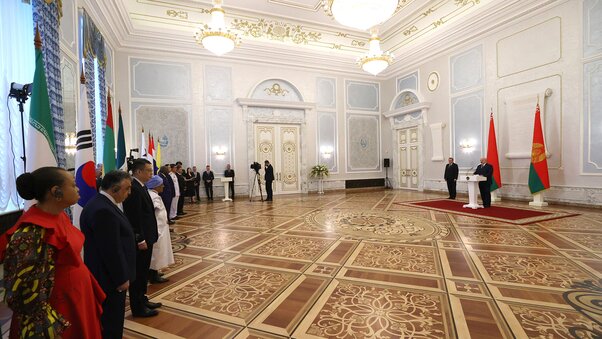Meeting to discuss improvements to Belarus’ HR policy
- 13
Belarusian President Aleksandr Lukashenko hosted a meeting to discuss improvements to the country’s HR policy on 16 June.
A wide range of representatives of the Belarus President Administration, the government, and the parliament as well as governors, ministers, and Presidential aides in the regions attended the meeting.
The President said that such a representative composition of the meeting was absolutely reasonable. “We are going to discuss the most important issue today. Human resources. Cadre are key. They decide everything. It is true,” the head of state said.
He pointed out that the meeting would discuss the personnel management policy, determine the prospects and outline shortcomings.
According to the President, Belarus has a well-organized system of state administration: the government regulates economy, Belarus President Administration - ideology, personnel issues, legal control and preparation of regulations by the head of state, governors supervise all these issues in regions, cities and districts.
“All the responsible officials have been identified. If you ask me if I am satisfied with the established system of personnel management, I will say no,” the Belarusian leader said. According to him, this pertains first of all to the performance of the Belarus President Administration, although the personnel policy, of course, is wider and involves everyone attending the meeting.
“We have a legal framework and good practices. But time marches on, and we have to improve our personnel management policy, and maybe even the whole system,” Aleksandr Lukashenko said.
Improvement of the HR policy is a complex multilevel task, which involves both the manufacturing and social sides. “I am not going to discover America here if I emphasize that the situation remains most stable in the enterprises which undertake all possible measures to retain personnel, including young specialists,” the head of state said. The Belarusian leader is convinced that an effective employee retention strategy should include both the best practices of the Soviet period and modern approaches.
“Unfortunately, we still have those who work using a band-aid approach. They don't have time to create attractive social and living conditions and they don't know how to communicate with the employees, and sometimes they simply do not want to,” the head of state said.
According to the President, some representatives of local authorities do not understand the depth of the issue and do nothing. “With this attitude, even our most ambitious economic plans will remain on paper, and, of course, I cannot let it happen. When analyzing the situation, I pointed out this problem last October and instructed the President Administration and the government to introduce a personnel relocation coordination system,” Aleksandr Lukashenko said and asked how efficient it was at local level and whether all the necessary measures were taken.
“The local authorities and company managers are gradually coming to understand that their responsibility for the HR policy will only be increasing. Yet, they have not started working to the full. Oblast executive committees still fail to ensure proper control over the activities of district and city executive committees. We still see a lot of red tape and a lack of executive discipline,” the head of state said.
Rotation of poor-performing managers from one post to another is akin to corruption
The practice of moving poor-performing managers from one post to another was another issue for discussion, Aleksandr Lukashenko said. According to him, the President Administration informed him about such facts. “Where are your decisions? Aleksandr Lukashenko asked. You are responsible for efficient HR work. Why do you keep complaining to me? Once again you make me talk about it and take measures. Make suggestions!” the head of state stressed, adding that the rotation of poor-performing managers from one post to another is akin to corruption.
He noted that back in 2014 Decree No. 5 banned to employ persons previously dismissed on discrediting grounds into senior positions. The President has been informed that control over this work has been put in place, although, as Aleksandr Lukashenko noted, there is still some work to be done in this area. "I'm afraid that if I decide to delve into the state of affairs in this area, as in healthcare, then, Igor Petrovich [Sergeyenko, head of the President Administration] and others may part with their jobs," the President said.
"Some executives begin to go easy on officials who failed in their jobs, to put it mildly. They’ve even started substituting the grounds for their dismissal providing a chance for fail officials to ‘pop up’ again in senior offices, as if nothing had happened. They want to be good to everyone," Aleksandr Lukashenko said. He stressed that the principles of work with personnel have been defined: no one has the right to appoint any of a dismissed official to a new high office, without the consent of the President. The head of state sometimes makes such decisions. "Such cases are many. The consent has been granted in many cases. People seem to be working well. But it required scrutiny to give assessment to those who have petitioned (mainly by governors)," Aleksandr Lukashenko said.
"Engaging in some kind of liberalism is not a state approach. This is covering up for each other. The responsibility here lies with the governors and chairmen of the city and district executive committees," the President added.
In order to strengthen the executive discipline and responsibility for the HR policy, the head of state suggested formalizing the current mechanism at the legislative level. The President Administration has proposed a draft decision of the head of state. "We will also discuss it today," Aleksandr Lukashenko said. “I would like to hear other rational suggestions from those who are present here today. They should also include incentives to attract and retain the human resources."
Head of the Belarus President Administration Igor Sergeyenko noted that the country has a multi-level HR system covering almost all HR matters for state bodies and organizations. According to him, there is the necessary legislative framework regulating the work of all subjects in this sphere of relations. Ten acts of the head of state, a number of government decrees, local documents of ministries and executive committees have been adopted.
In this regard, Aleksandr Lukashenko demanded: "If we set out to improve something, we need to remove all government acts on HR matters. This is not their business. They have their own domain. On our part we do not pass any document without them. They may nominate a dozen candidates. It is you who analyze nominations and submit them to the President. It is not because I don't trust the government. It’s just that we duplicate functions. What for? We have a body that deals with the HR policy. Why do we need any more government resolutions to follow up on the President's decisions? This is the shortcoming we need to fix."
"No reference documents," the head of state continued. “We need one regulatory legal act to make sure everything is clear. A decision has been made and is exhaustive. There should be no reference documents and instructions."


